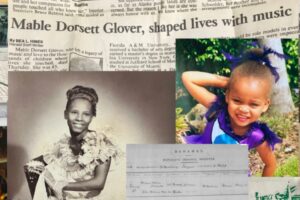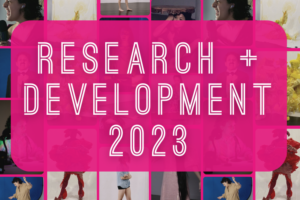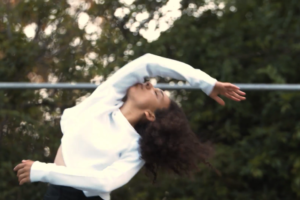By Gina Young
For R+D 2024, San Cha (she/they) will be adapting her album La Luz De Esperanza into an experimental opera titled Inebria me. San Cha is the composer, librettist and lead performer in this project, which fuses visual art, performance art, dance, and technology, with music that spans Ranchera, punk, classical, and electro.
In the story, a beauty of humble means named Dolores is caught in a web of jealousy and abuse after marrying wealthy Salvador. During a particularly dark moment, Dolores is visited by a being of light and empowerment, Esperanza, that gives her the strength to escape Salvador’s control and realize her true value.
Genre-bending Inebria me blends the forms of opera and telenovela, dispelling cisgender and heteronormative archetypes in a queering of both forms. I caught up with San Cha shortly following a club performance where they unveiled songs they’ve never performed live before.
______________
LAPP is really excited to support Inebria me!
I’m excited for its new life! It feels already so fresh and like the ideas are just flying at me.
Your work incorporates a wide variety of influences, and I really like how you spoke in your artist statement about not fragmenting and compartmentalizing yourself. Can you say a little bit about what that means to you as an artist?
To express to my fullest self is the goal, but it almost happens in everything that some part is left behind. Like when I’m performing for a crowd that wants to see mariachi and classic bolero covers, I’m missing the songwriter part of me and the part of me that loves electronics. With this work, I want to make a piece that all of these sides of me can relate to. Like the experimental with the traditional, the Latin rhythms with the western classical and the electronics. It means to me that I can invite my parents and my weird art friends, and the punks, and club girls, and have them all in one room.

I love that. Not needing to leave any parts of yourself or any aspect of your artistic interests out of the work. What inspired you to blend opera and telenovelas?
Well, the story started as a telenovela idea. And when I was writing the album La Luz de la Esperanza I started taking voice lessons with Micaela Tobin, and that moved my voice in a more operatic direction. I’ve also always thought about the crossover between ranchera/mariachi and opera. A lot of the songs I cover were sung by mariachi singers that started as opera singers. I also feel like the tragedy of telenovelas is the same kind of exaggeration you find in opera.
There’s definitely a parallel in the heightened emotions.
And so much opulence. Telenovelas always highlight classism, as do operas. The stories sort of blend, and it just sort of happened that when I performed La Luz de la Esperanza people started calling it my opera.

Sounds like it took on a life of its own! You speak of “queering” the opera and telenovela forms–can you say a little more about what that means to you?
The story is about magnifying what I’ve seen romanced and glorified in telenovelas. The way men act towards women, the way they just physically take a woman and pull her is seen as romantic. Gender roles in real life are affirmed by what we see in everyday telenovelas, so I wanted to show how not-consensual a lot of those actions are, and make a story about a love that is about consent, about tenderness, and not about gender, and not about control or ownership. So I juxtapose the relationship the main character, Dolores, has with the man, Salvador, with the relationship she has with Esperanza, the unearthly light figure with no body. The relationship with Salvador is what fairy tales are made of, but it doesn’t bring Dolores joy. It leads her to sadness and feeling trapped.

What sort of themes does Inebria me explore?
I wanted to focus Inebria me on the communion part of the story, how you can find ecstasy through consumption of light. Ecstasy and freedom. I’m exploring some theatrical methods, like telenovela flash backs and internal monologues. Also narration. I also want to give more story to the sisters/back up singers, and create a story that deals with envy and jealousy, but that leads to the creation of queer family.
Inebria me is epic in scope and it is the reimagining of a previous project–how do you imagine the process for this early stage of development?
I want to work with a dramaturg. There’s parts of the story that I really want to flesh out this year, along with what the timeline of the story is. I have a residency in Portland in the later part of August where I can explore some staging, then a residency in San Jose in December, where I can focus on the music. I applied for a residency that would be January through April of next year.
So you’re looking at a nice long developmental phase!
Yes! Reworking lyrics and all.
How will your LAPP R+D be different from the other residencies? Is R+D the first in the process?
Yes, it’s the first in the process. It feels like the most tangible right now; the dramaturg and shaping the story and research.
What are you most excited about exploring with Inebria me?
I think the story development is the most exciting for me.
What is your desired ideal outcome from your time in exploration with R+D?
The ideal outcome is that I have a clear and actionable direction. That I feel so inspired to work on the development consistently.
______________

San Cha (she/they) is a queer Latine musician and performance artist who uses ‘novela’ inspired performances to tell stories about colonization and heartbreak with the aims of liberation and healing. With influences ranging from Catholic hymns, Mexican corridos, rancheras, and cumbias to punk queer electroclash, drag, and nightlife, San Cha weaves together parts of her identity that were often severed and compartmentalized. For her, music is a personal and political vehicle to usher socio-political change and liberation.
San Cha has had projects, performances, and residencies with the Getty, LACMA, Performance Space New York, Ballroom Marfa, PICA’s TBA Festival, Long Beach Opera, and many more. They also showed as part of Los Angeles Performance Practice’s LAX Festival 2023, and LAPP is honored to continue that relationship with this work.




